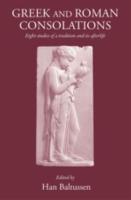
Classical Press of Wales (2013) h/b 200pp £47.17 (ISBN 9781905125562)
This book, like so many, had its origins in a colloquium, held at the ICS in London in 2007, though ‘some papers were subsequently commissioned for the collection’: hence, one assumes, the lengthy gestation. Certainly, seekers after knowledge on the subject are more likely than not to find what they want, though the reviewer was somewhat disappointed not to see any discussion of that well-known poem attributed to pseudo-Ovid, the Consolatio ad Liviam. B.’s Introduction admirably covers the book’s contents, and is followed by a wealth of footnotes and a lengthy bibliography (as, indeed, are the individual essays). B. also offers an essay on Cicero’s ‘curious’—and fragmentary—Consolatio ad se. Worthy of note are J.H.K.O. Chong-Gossard’s ‘Mourning and Consolation in Greek Tragedy: the rejection of comfort’, and D. Konstan’s ‘The Grieving Self: Reflections on Lucian’s ‘On Mourning’ and the consolatory tradition’. (Why have titles become so elongated?). C.-G.’s essay concentrates on the refusal to be consoled: good examples come from Euripidean fragments (notably Dictys and Hypsipyle), his Alcestis, and from Sophocles’ Electra. ‘That (i.e. refusal of attempted consolation) is the vicious nature of a genre based on extraordinary characters from mythology’. Well, yes, but this is, after all, Greek tragedy, in which kakon kakois kakon pherei..
Konstan has a perhaps more agreeable task in looking at Lucian’s unsurprisingly satirical critique of mourning practices and consolatory literature (typically, he points out that the lamentations of the living are no use to the dead, any more than are garlands on tombstones and the like, while implying that it is a hypocritical charade when, say, parents are coaxed to eat at the funeral feast): has the time come for more critical attention to be paid to this prolific, but rather under-studied author? Incidentally, guidance about where best to locate this work, e.g. in the Loeb Library edition of Lucian, would have been helpful.
J.H.D. Scourfield finds the ‘genre’ of ‘consolation’ abnormally fluid and hard to define: since, not without justice, he even wonders how far it is a meaningful category at all, his conclusion that consolation is ubiquitous and universal need occasion no surprise, for him or us. (His 138 footnotes, though, provide plenty of meat). Marcus Wilson offers a new reading of Seneca’s consolatory writings (was Seneca’s aim not to sympathise but to shock?) and Josef Loessl writes about Augustine of Hippo, arguing that his work should be interpreted as ‘both a continuity and a transformation of ancient consolation’. Peter Adamson shows the close link between Arabic ethical treatises and Greek philosophical consolation; G. Boys-Stones uses the example of the pseudo-Plutarchan Consolatio ad Apollonium to take a ‘clean run’ at considering how a philosopher might view or use consolation in general.
Your reviewer was left with the reflection that the mountains have indeed laboured greatly, but that the end-product will be of necessarily specialist interest. Sensibly, passages in Greek and Latin are translated. The book production is of a notably high standard
Colin Leach
